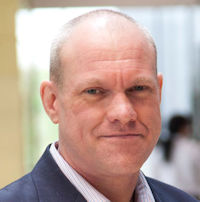The Factory of the Future – Industry 4.0 part of The York Management School Masterclass series

Thursday 27 October 2016, 11.30AM to 13.00
Speaker(s): Alan Norbury, Central Technology Officer for Siemens UK
International investors no longer locate their businesses based on labour costs alone. Many locate in the UK because of our strengths in R&D, technology and skills. Some commentators suggest we are on the cusp of a fourth industrial revolution -‘Industrie 4.0’ - driven by ‘embedded’ or ‘cyber physical’ systems interacting intelligently. So what does this mean for UK productivity and growth? How will technologies change the way we do business? Are we about to witness a period of advanced reindustrialisation?
Alan Norbury is the Central Technology Officer for Siemens UK industrial activities - a leading global supplier of industrial plant and software, manufacturing automation and drive technologies to industrial customers across the UK and Ireland. Alan will be exploring these and many other questions about the Factories of the future.
Alan works closely with the High Value Manufacturing Catapult Centres, particularly the MTC in Coventry and the AMRC in Sheffield. He dedicates his time to developing leading technology innovation which seeks to benefit Siemens UK manufacturing facilities and also Siemens industrial customers. Alan is a regular Industry 4.0 keynote speaker, sits on the IET Design and Production Sector Executive Board and the Northern Robotics Network Advisory Board.
Since the first Industrial Revolution, technology has been the primary enabler of productivity in manufacturing. Early developments were mechanised such as Edmund Cartwright’s loom in 1784 which was based on a shaft drive and enabled textile production beyond labour based methods. A second productivity leap was evident by the late 1800s, resulting from the introduction of electrical energy (conveyors driven by electrical motors for example) and labour division concepts that became central to the success of mass production since their first use in the slaughterhouses and meat packing businesses of Cincinnati around 1825. It wasn’t until the
1960s however that a third significant productivity change was achieved. This was when factories began to exploit intelligent manufacturing technology and programmable automationand robotic systems were introduced making growth possible in key sectors like automotive and electronics.
Today, manufacturing is changing faster than ever before and the drivers for this include globalisation, individualisation, time to market and sustainability. Energy and resourceefficiency are increasingly decisive factors in manufacturing competitiveness, even in developing economies which are adopting automation technology at rates that look set to further improve their traditional cost advantage.
Globalisation is driving the need for shorter innovation cycles, as time-to- market represents a competitive advantage for an increasing number of products. Localisation agendas are moreapparent all over the globe too, driven by interests in local manufacturing and jobs. Manufactured products themselves are becoming more complex and data generated from their production, distribution and use is growing exponentially.
In essence, Industry 4.0 will involve the technical integration of Cyber-Physical Systems into manufacturing and logistics and the use of the Internet of Things and Services in industrial processes. This will have implications for value creation, business models, downstream services and work organisation. Siemens believes Industry 4.0 will be key to integrating product and production lifecycles but users today can already benefit from foundation technologies such as industrial networks, sensors and software tools that enable the digital manufacturing enterprise.
Location: The York Management School, LMB 002X
Admission: Free ticketed event
Email: morag.lehrle@york.ac.uk
Telephone: 01904 325014
